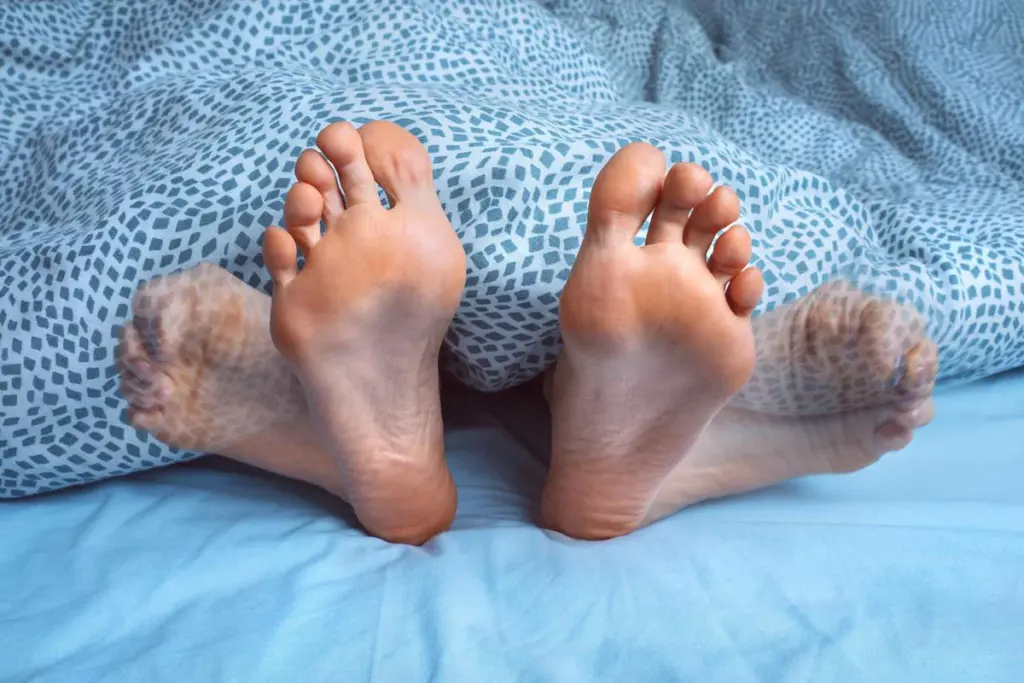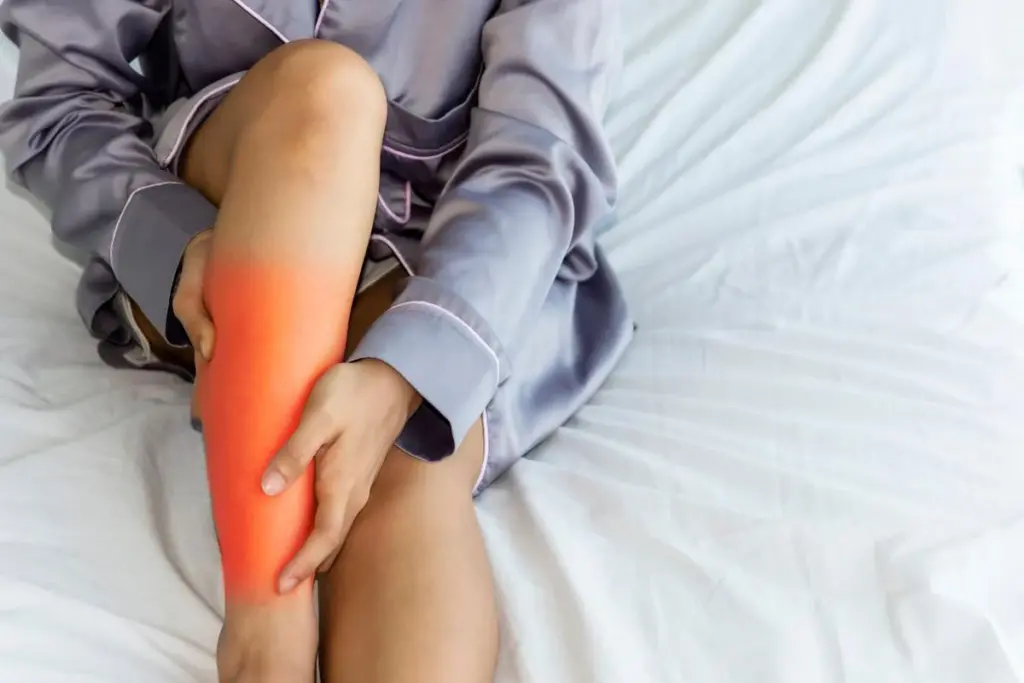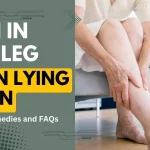Do you suffer excruciating leg pain that keeps you up at night? If so, you’re not alone. Many individuals experience severe leg pain that disrupts their sleep and negatively impacts their daily life. This article will explore how to relieve severe leg pain at night causes, symptoms, and various treatment options that can help alleviate nighttime leg pain.
The consequences of leg pain at night go far beyond a mere inconvenience. If you get enough quality sleep, you may feel energized during the day, positively impacting your productivity and overall well-being. Chronic leg pain can also restrict your mobility, making engaging in physical activities or leisurely pursuits challenging. It’s crucial to address this issue and seek effective relief.
Exploring the Causes of Severe Leg Pain at Night
Peripheral Artery Disease (PAD) and its Association with Nocturnal Leg Pain
Peripheral Artery Disease (PAD) is characterized by narrowing of the arteries in the legs, leading to reduced blood flow. This restriction can cause severe leg pain, particularly at night when blood circulation may be further compromised. Understanding the connection between PAD and nocturnal leg pain is essential in seeking appropriate treatment.
Restless Leg Syndrome (RLS) and its Contribution to Nighttime Discomfort
Restless Leg Syndrome (RLS) is a neurological disorder characterized by uncomfortable sensations and an irresistible urge to move the legs. These symptoms intensify during rest or inactivity, making falling and staying asleep difficult. RLS can significantly contribute to nighttime discomfort and disrupt your sleep patterns.
Chronic Venous Insufficiency (CVI) and its Connection to Leg Pain During Sleep
Chronic Venous Insufficiency (CVI) occurs when the veins in the legs fail to transport blood back to the heart efficiently. As a result, blood pools in the legs, causing swelling, pain, and aching sensations, especially when lying down. Understanding the relationship between CVI and leg pain during sleep is crucial for effectively managing the condition.
Recognizing the Symptoms of Severe Leg Pain at Night
Dissecting the Unique Sensations Experienced During Nighttime Leg Pain
Nighttime leg pain can manifest in various ways, ranging from aching and throbbing sensations to sharp, shooting pains. Some individuals may also experience tingling, numbness, or a feeling of heaviness in their legs. Recognizing these unique sensations can help understand the underlying cause and seek appropriate medical attention.
Identifying the Additional Symptoms Accompanying Severe Leg Pain
In addition to the physical discomfort, severe leg pain at night may accompany other symptoms. These can include muscle cramps, restless leg movements, sleep disturbances, and mood changes due to poor-quality sleep. Identifying these associated symptoms is vital for accurate diagnosis and comprehensive treatment.
Seeking Medical Advice for Accurate Diagnosis and Treatment Options
If you have severe leg pain at night, seeing a healthcare professional who can accurately diagnose the root cause is important. They can suggest suitable treatments based on your specific needs. Avoid self-diagnosis and self-medication, as they can worsen the issue.
Diagnosis and Medical Intervention for Nighttime Leg Pain

The Importance of Medical Consultation for Persistent Leg Pain
When it comes to persistent leg pain at night, seeking medical consultation is crucial. A healthcare professional will thoroughly evaluate your medical history, symptoms, and any relevant diagnostic tests to determine the root cause of your leg pain. This comprehensive approach will guide the subsequent treatment plan and ensure adequate pain relief.
Diagnostic Tests that Assist in Identifying the Underlying Cause of Nighttime Leg Pain
Your healthcare provider may recommend various diagnostic tests to identify the underlying cause of your nighttime leg pain. These can include Doppler ultrasound to assess blood flow, electromyography (EMG) to evaluate nerve function, or even imaging studies such as MRI or CT scans to examine the structure of your legs. These tests provide valuable insights for accurate diagnosis.
Medications and Medical Interventions Prescribed to Alleviate Severe Leg Pain Infections
After receiving an accurate diagnosis, your healthcare provider might prescribe medications tailored to relieve severe leg pain. These medications could include pain relievers, muscle relaxants, or drugs that enhance blood flow and reduce inflammation. In certain situations, medical interventions like angioplasty or surgery might be required to treat the underlying condition responsible for the leg pain.
Applying Lifestyle and Home Remedies to Relieve Leg Pain at Night
Establishing a Relaxing Bedtime Routine to Ease Leg Pain
Building a relaxing bedtime routine can significantly contribute to relieving leg pain at night. Engaging in warm baths, gentle stretching, or relaxation techniques like deep breathing or meditation can help calm your body and mind before sleep. Creating a peaceful environment conducive to restful sleep is important in managing nighttime leg pain.
Stretching and Exercising Techniques that Target Leg Muscles and Alleviate Pain
Incorporating targeted stretching and exercising techniques into your daily routine can alleviate leg pain and improve muscle strength. Exercises focusing on your calf muscles, such as ankle pumps or toe points, can help relieve cramping and reduce leg pain. Consult a physical therapist or healthcare professional for specific exercises tailored to your needs.
Utilizing Heat and Cold Therapy for Immediate Relief During Episodes of Intense Pain
Both heat and cold therapy can offer immediate relief during episodes of intense leg pain. Applying a heating pad or warm compress to your legs can help relax muscles and improve blood circulation. Conversely, cold therapy, such as using an ice pack, can help numb the area and reduce inflammation. Choose which therapy works best for you, and always remember to use a barrier between your skin and the heat or cold source to prevent burns or frostbite.
Enhancing Sleep Environment for Better Pain Management
Selecting the Right Mattress and Pillows to Support Leg Comfort
Investing in supportive mattresses and pillows can significantly improve sleep quality and help manage leg pain. Look for a mattress that provides adequate support and distributes your body weight evenly. Pillows that provide proper spinal alignment and cushioning for your legs can also contribute to reduced discomfort and better pain management.
Creating a Conducive Sleeping Environment for Minimizing Leg Pain Interruptions
Designing a sleep environment that promotes relaxation and minimizes leg pain interruptions is crucial to ensure a good night’s sleep. Consider factors such as room temperature, lighting, and noise level. Blackout curtains, earplugs, or white noise machines can help create an optimal sleep environment. Additionally, keeping your bedroom clutter-free and promoting a calm ambiance can aid in minimizing leg pain disruptions.
The Role of Sleep Hygiene in Managing and Preventing Nighttime Leg Pain
Good sleep hygiene habits are essential for managing and preventing nighttime leg pain. Establish a consistent sleep schedule, avoid stimulating activities or electronic devices close to bedtime, and create a comfortable and dark sleep environment. Incorporating these sleep hygiene practices into your routine can improve sleep quality and reduce leg pain at night.
The Benefits of Physical Therapy and Exercise for Nighttime Leg Pain
Incorporating Targeted Exercises and Physical Therapy to Alleviate Pain Symptoms
Physical therapy, under the guidance of a professional, can play a significant role in alleviating leg pain symptoms. A physical therapist can design personalized exercises and manual techniques to improve leg strength, flexibility, and blood circulation. Engaging in a targeted exercise program and attending regular physical therapy sessions can help manage your nighttime leg pain and improve overall leg function.
Recommendations for Exercising Safely While Experiencing Leg Pain at Night
Exercising safely is crucial, especially if you’re experiencing leg pain at night. Start with low-impact activities such as walking or swimming, gradually increasing intensity as tolerated. Wear supportive shoes and appropriate braces or compression garments that provide added stability during exercise. Always listen to your body and consult a healthcare professional if you experience persistent or worsening pain during exercise.
The Long-Term Benefits of Regular Physical Activity in Reducing Nighttime Leg Pain
Engaging in regular physical activity offers numerous benefits in reducing nighttime leg pain. Exercise helps improve blood circulation, strengthens muscles, and can contribute to weight management. These long-term benefits can significantly reduce the frequency and severity of leg pain episodes, promoting better sleep and enhancing overall quality of life.
Natural Remedies and Alternative Treatments for Nighttime Leg Pain

Exploring Complementary Therapies Such as Acupuncture and Acupressure
Complementary therapies, such as acupuncture and acupressure, have gained popularity in relieving leg pain. Acupuncture involves the insertion of thin needles into specific points on the body, while acupressure applies pressure to these exact points. These ancient practices stimulate the body’s natural healing mechanisms, potentially reducing leg pain. However, consulting a qualified healthcare professional before trying these alternative treatments is essential.
The Potential Benefits of Herbal Supplements and Natural Remedies to Alleviate Leg Pain
Certain herbal supplements and natural remedies have been associated with pain relief and may offer potential benefits for nighttime leg pain. Examples include turmeric, ginger, or magnesium supplements, which have anti-inflammatory properties. However, it is crucial to remember that not all natural remedies are suitable for everyone, and consulting a healthcare professional is necessary to ensure their safety and efficacy.
The Importance of Consulting Healthcare Professionals Before Trying Alternative Treatments
Before embarking on alternative treatments for nighttime leg pain, it is vital to consult healthcare professionals. They can assess your overall health, discuss potential interactions with any medications you are taking and guide you toward the most appropriate course of action. Healthcare professionals have the expertise to ensure your safety and optimize the effectiveness of any treatment you pursue.
Lifestyle Adjustments for Long-Term Leg Pain Management
Dietary Changes that May Positively Impact Nighttime Leg Pain
Making certain dietary changes can positively impact nighttime leg pain. Including potassium-rich foods, such as bananas or leafy greens, can help prevent muscle cramps. Moreover, reducing sodium intake and staying hydrated can improve overall leg health. Always consult a healthcare professional or nutritionist to tailor dietary adjustments to your needs and medical conditions.
Controlling Stress Levels and Incorporating Relaxation Techniques to Manage Leg Pain
Stress can exacerbate leg pain, so finding healthy ways to manage stress is crucial for long-term leg pain management. Relaxation techniques such as deep breathing exercises, meditation, or yoga can help alleviate physical and emotional tension. Taking time for self-care activities and finding stress-reducing outlets that work for you can lead to improved well-being and leg pain management.
The Role of Maintaining a Healthy Weight and its Effect on Nighttime Leg Pain
Maintaining a healthy weight can significantly impact nighttime leg pain management. Excess weight places additional strain on your legs and exacerbates pain symptoms. Adopting a balanced and nutritious diet and regular physical activity can help achieve a healthy weight, reduce pressure on your legs and alleviate pain during sleep.
Understanding Medication Options for Severe Leg Pain at Night
Commonly Prescribed Medications for Relieving Leg Pain During Sleep
In cases where lifestyle changes and home remedies may not provide sufficient relief, healthcare professionals may prescribe medications to alleviate severe leg pain at night. These medications could include pain relievers such as nonsteroidal anti-inflammatory drugs (NSAIDs) or opioids for short-term management. Other possibilities include muscle relaxants or medications that target specific causes, like anticoagulants for blood clot-related leg pain. Following your healthcare professional’s instructions and being aware of potential side effects is important.
The Potential Side Effects and Precautions Associated with Pain Medication Usage
While pain medications can bring significant relief, it is crucial to be aware of potential side effects and take necessary precautions. Some pain medications may cause drowsiness or dizziness, affecting your daytime activities or sleep quality. Moreover, long-term use of certain medications may adversely affect your overall health. Always consult with your healthcare provider, adhere to prescribed dosages, and inform them of any concerning side effects you experience.
Exploring Surgical Options and Interventional Procedures

Surgical Interventions for Severe, Chronic Leg Pain Conditions
In severe cases, surgical interventions may be necessary to address the root causes of chronic leg pain. For example, bypass surgery or artery stenting can restore blood flow in peripheral artery disease. Additionally, surgery to repair valve function or remove varicose veins may be recommended for chronic venous insufficiency. Surgical options should be considered only after exhausting conservative approaches and following a thorough evaluation by a surgical specialist.
Minimally Invasive Procedures to Alleviate Specific Leg Pain Causes
In recent years, minimally invasive procedures have been developed to alleviate specific leg pain causes. These procedures, such as endovascular interventions or ablation techniques, offer less invasive alternatives than traditional open surgeries. Minimally invasive options can provide effective relief while minimizing the risks and recovery time associated with more invasive procedures.
Weighing the Risks and Benefits of Surgical Treatment vs. Conservative Approaches
When considering surgical treatment for leg pain, weighing the potential risks against the expected benefits is essential. Surgery may be suitable for severe or progressive conditions that do not respond to conservative approaches. However, it is important to have open discussions with your healthcare providers about potential outcomes, complications, and the expected impact on your quality of life before making a decision.
Coping Strategies and Emotional Support for Nighttime Leg Pain
Seeking Support from Peers and Joining Support Groups to Manage Leg Pain
Managing nighttime leg pain involves not only physical treatment but also emotional support. Seeking support from others who experience similar challenges can provide valuable insight, encouragement, and coping strategies. Joining support groups, whether in-person or online, can create a sense of community and help you navigate the emotional impact of persistent leg pain.
Psychological Techniques to Control Pain Perception and Enhance Well-being
Psychological techniques can be powerful tools for managing leg pain perception and enhancing overall well-being. Cognitive-behavioral therapy (CBT) and mindfulness-based stress reduction (MBSR) are often utilized in chronic pain management. These techniques help develop coping mechanisms, refocus attention away from pain, and reduce the emotional burden of nighttime leg pain.
The Importance of Addressing the Emotional Impact of Persistent Leg Pain
Persistent leg pain can have an emotional toll, leading to anxiety, depression, frustration, or loss of motivation. Addressing the emotional impact of leg pain and seeking appropriate support is important. Consult with mental health professionals who can provide guidance, therapy, or counseling to help manage and alleviate emotional distress associated with your leg pain.
In Conclusion, Nighttime leg pain can significantly disrupt sleep and daily life. Understanding the causes, recognizing the symptoms, and seeking appropriate medical intervention are essential to finding relief. By exploring various treatment options, adopting lifestyle adjustments, and addressing the emotional impact, you can effectively manage, reduce and even prevent severe leg pain at night. Remember, consult with healthcare professionals, be patient with the process, and prioritize your well-being.
I think you may like: Leg Pain When Walking and Standing
Frequently Asked Questions (FAQs)
How long does it take to relieve nighttime leg pain with home remedies?
The time it takes to find relief from nighttime leg pain using home remedies can vary depending on the individual and the underlying cause. In some cases, relief may be immediate, while in others, it may take several days or weeks of consistent application of home remedies to experience significant improvement.
Can chronic leg pain at night lead to complications if left untreated?
Chronic leg pain at night can lead to complications if left untreated. If the underlying cause of the pain is not addressed, it can worsen over time and affect your overall quality of life. Additionally, chronic pain can disrupt sleep patterns, leading to sleep deprivation and its associated complications.
Are there any precautions to consider when trying natural remedies for leg pain?
When trying natural remedies for leg pain, it’s important to consider a few precautions:
- Consult a healthcare professional: If you’re unsure about the cause or severity of your leg pain, it’s advisable to consult a healthcare professional for an accurate diagnosis and appropriate guidance.
- Allergies and interactions: Some natural remedies may cause allergic reactions or interact with medications you’re currently taking. Check for any potential allergies or contraindications before using a new remedy.
- Dosage and application: Follow natural remedies’ recommended dosage and application instructions. Using excessive amounts or improper application methods may lead to adverse effects.
What lifestyle changes can significantly impact the frequency and severity of leg pain?
Certain lifestyle changes can significantly impact the frequency and severity of leg pain. Here are a few suggestions:
- Regular exercise: Engaging in low-impact exercises like walking, swimming, or cycling can help improve circulation, strengthen muscles and reduce leg pain.
- Maintaining a healthy weight: Excess weight can strain your legs and exacerbate pain. Adopting a balanced diet and maintaining a healthy weight can relieve pressure on the legs.
- Proper footwear: Wearing supportive shoes that fit well can provide better cushioning and support for your feet and legs, reducing pain and discomfort.
- Stretching and strengthening exercises: Incorporating stretching and strengthening exercises specifically targeting the leg muscles can help alleviate pain and improve flexibility.
- Avoid prolonged sitting or standing: If your lifestyle involves extended periods of sitting or standing, try to take breaks and move around regularly to prevent leg pain caused by poor circulation.
How can I differentiate between nighttime leg cramps and severe leg pain?
Distinguishing between normal nighttime leg cramps and severe leg pain can be challenging. Here are a few factors to consider:
- Intensity and duration: Leg cramps often last a few seconds to a few minutes and can be intense, but they usually subside relatively quickly. Severe leg pain, on the other hand, may persist for a longer duration and have a more intense and continuous nature.
- Frequency: Leg cramps are infrequent and occur sporadically, while severe leg pain may be persistent or occur frequently.
- Underlying causes: Leg cramps are commonly caused by muscle fatigue, dehydration, or electrolyte imbalances, while severe leg pain can be associated with conditions like peripheral artery disease, nerve compression, or musculoskeletal disorders.



